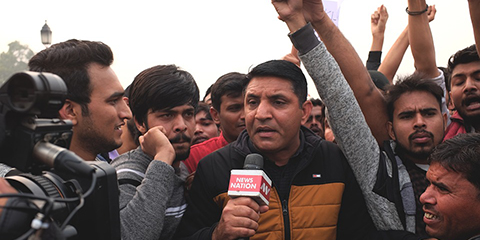The surge of independent media in Asia: A new dawn for journalism
JournalismPakistan.com | Published last year | Rohan Malik and Ayesha Javed
Join our WhatsApp channel
ISLAMABAD—In recent years, Asia has witnessed a remarkable surge in the number of independent media outlets, signaling a transformative shift in the region's journalism landscape. These new voices are not only challenging the traditional media giants but are also redefining the way news is reported and consumed. The rise of independent media in Asia is a testament to the growing demand for diverse, transparent, and unbiased reporting.
A New Era of Journalism
Independent media outlets in Asia have emerged as beacons of hope for those seeking alternative narratives and unfiltered news. In countries like Pakistan and India, where mainstream media often faces government pressures and corporate influence, independent journalists are carving out spaces for free expression and investigative reporting.
Take, for instance, The Wire in India, an online platform launched by a group of journalists. The outlet focuses on investigative journalism and in-depth analysis, covering stories that are often overlooked by traditional media. Similarly, Voicepk.net in Pakistan has gained a reputation for its fearless reporting on social issues.
Breaking Barriers
One of the significant advantages of independent media is its ability to operate without the constraints of large corporate ownership. This freedom allows these outlets to address sensitive and controversial topics that are crucial for public awareness but might be ignored or downplayed by mainstream media.
However, this independence comes with its own set of challenges. Financial sustainability is a major hurdle for many independent media outlets. Unlike established media houses with substantial advertising revenues, independent platforms often rely on donations, subscriptions, and grants to fund their operations. Despite these obstacles, the commitment of these journalists to uphold the principles of free press and accountability remains unwavering.
Digital Revolution
The digital revolution has played a pivotal role in the rise of independent media in Asia. With the advent of social media and digital platforms, independent journalists now have the tools to reach a wider audience. Platforms like YouTube, Twitter, and Facebook have become essential channels for disseminating news and engaging with readers.
For example, Rappler in the Philippines utilizes social media extensively to report on human rights abuses and government malfeasance. Their innovative approach to storytelling, combined with the power of digital media, has garnered them a substantial following and credibility among their audience.
Shaping Public Opinion
Independent media outlets are not just reporting news; they are actively shaping public opinion and fostering a culture of critical thinking. By providing a platform for diverse voices and perspectives, these outlets contribute to a more informed and engaged citizenry.
In India, the rise of Scroll.in, an independent media platform, has empowered young journalists to tackle issues such as climate change, gender equality, and educational reform. Their impactful stories have sparked national conversations and inspired civic action.
The Road Ahead
The future of independent media in Asia looks promising, but it is not without its challenges. Ensuring financial viability, maintaining journalistic integrity, and navigating the complex political landscapes are some of the issues that need to be addressed. However, the resilience and determination of these media pioneers offer hope for a more transparent and accountable media environment in Asia.
As independent media outlets continue to grow and evolve, they hold the potential to revolutionize journalism in Asia, providing the public with the diverse and unbiased reporting they deserve.
The rise of independent media outlets in Asia signifies a significant shift towards a more open and democratic media landscape. As these new voices continue to challenge the status quo, they are reshaping the future of journalism in the region.
About the Authors: Rohan Malik is an independent journalist based in New Delhi, India, with over a decade of experience in covering media trends and developments in Asia. Ayesha Javed is a media analyst and writer from Karachi, Pakistan, specializing in digital journalism and press freedom.
Photo: Representational

























